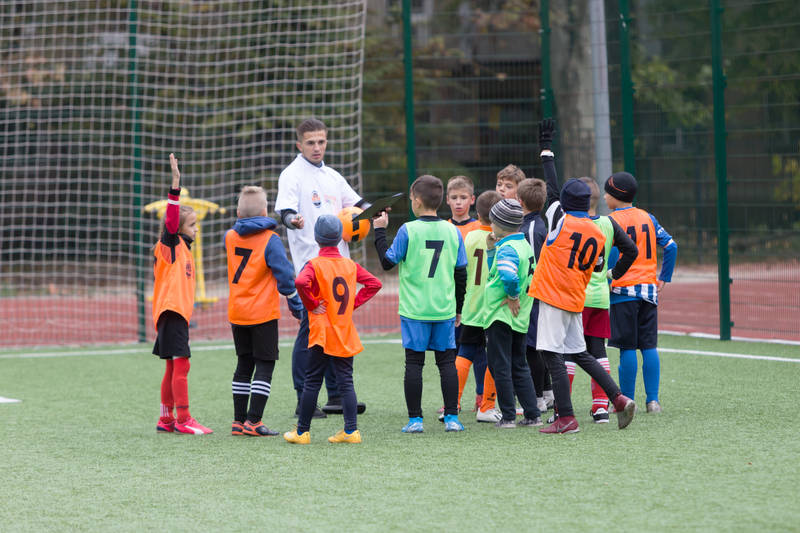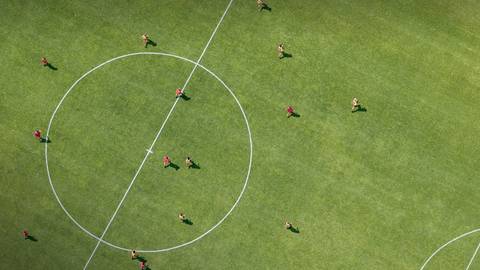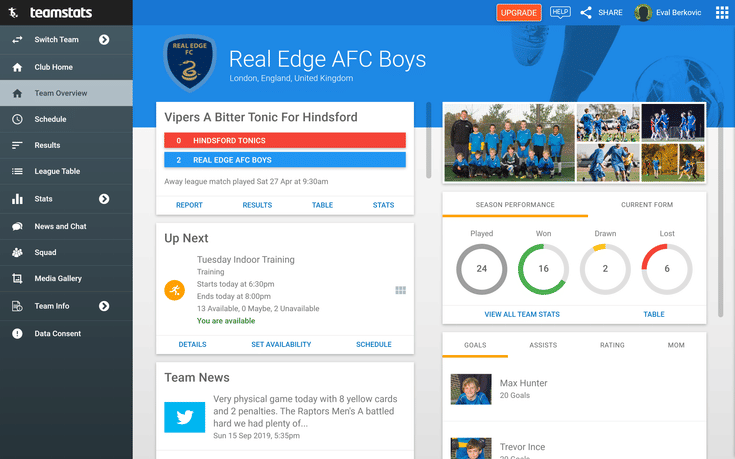U7 football represents the entry point for many children into organised team sports in the UK. For children under 7 years old (based on their age as of 31st August at midnight in any given season), this developmental stage focuses on building fundamental skills rather than competitive outcomes. U7 players do not participate in formal leagues but instead can take part in a maximum of three trophy events during the season, allowing them to experience structured play without excessive competitive pressure.
The format of U7 football is specifically designed to be age-appropriate, with smaller pitches, fewer players, and simplified rules compared to the adult game. Training sessions typically incorporate fun activities that develop basic techniques such as dribbling, passing, and balance, often beginning with simple activation exercises like kick-ups to improve footwork and coordination.
For coaches working with U7 teams, it's essential to create an environment that nurtures enthusiasm while gradually introducing soccer fundamentals. The 2024-2025 season welcomes children born in 2018, giving them their first taste of structured football in a supportive setting that prioritises enjoyment and skill development over results.
Understanding U7 Football
U7 football represents an important first step in a child's sporting journey. This introductory level focuses on fun, basic skills development, and creating a positive experience that builds a foundation for future footballing growth.
The Basics of U7 Football
U7 football is played in a 7v7 format, scaled appropriately for younger players. Matches take place on smaller pitches with reduced-size goals to accommodate the physical capabilities of children in this age group.
Game duration typically runs between 20-30 minutes, divided into equal halves. The rules are simplified versions of the adult game, with no offside rules and more lenient enforcement to encourage participation.
According to search results, children at this age don't participate in competitive leagues. Instead, they can take part in a maximum of three trophy events during a season, keeping the focus on development rather than competition.
Age Group and Developmental Focus
The U7 designation refers to children under 7 years of age, with eligibility typically determined by the child's age as of 31st August at midnight in any given season. At this stage, children are still developing fundamental movement skills and basic coordination.
Training sessions should emphasise fun activities that build fundamental skills like dribbling, passing, and ball control. Coaches should create a positive environment where mistakes are viewed as learning opportunities.
Many experts consider this age crucial for long-term development. The search results suggest youth football (sometimes called soccer in international contexts) requires careful management at this stage, as it's a formative period in children's sporting development.
For new teams and coaches, patience is essential. As one source notes, "it takes time" to build cohesion as everyone is on a journey together.
Season Structure and Competitions
The U7 football season offers young players their first taste of structured competition through various formats designed specifically for their developmental stage. These competitions balance competitive play with skill development in an age-appropriate environment.
Season Layout and Timeline
The typical U7 football season in the UK follows the school calendar, running from September to May with a winter break during December-January. Most local leagues divide the season into autumn and spring phases, allowing for development assessment and team rebalancing at the midway point if necessary.
Training sessions usually occur once or twice weekly, with matches typically scheduled for Saturday or Sunday mornings. Each match lasts approximately 40 minutes total (20 minutes each way) as specified by FA guidelines. This duration is carefully calibrated to match the concentration spans and physical capabilities of 6-7 year olds.
Weather considerations often impact the season flow, with some leagues scheduling indoor futsal during winter months to ensure continuous player development despite challenging conditions.
Types of U7 Competitions
The primary competition format for U7 football is 5v5 matches played on appropriately sized pitches. These smaller-sided games ensure more touches on the ball and greater involvement for all players.
Local leagues form the backbone of the competitive structure, with teams generally playing in geographical clusters to minimise travel time. These leagues typically use non-competitive formats where results are recorded but no league tables are published, in accordance with FA philosophy for this age group.
Development festivals represent another key competition type, featuring multiple teams playing shortened matches in a round-robin format. These events emphasise participation and enjoyment rather than competitive outcomes.
Some academies and development centres also organise regular friendly fixtures against similar programmes, providing additional playing opportunities beyond league commitments.
Cup Tournaments and Divisional Play
While traditional knockout cup competitions are less common at U7 level, many regions offer tournament days or weekend festivals that serve as celebratory events. These typically feature group stages followed by placement matches rather than direct elimination.
Regional tournaments may serve as qualifiers for larger events, though at U7 level these rarely lead to national competitions. When divisional structures exist, they typically group teams by geographical location rather than ability levels to support development and reduce travel demands.
Tournament formats usually adhere to the following structure:
- Group stages: 4-5 teams playing short matches (10-15 minutes)
- Trophy/plate/shield divisions: Ensuring appropriate competition levels
- Maximum playing time: Capped at FA-recommended limits for the age group
Many clubs also participate in summer tournaments as season-ending celebrations, offering a festive atmosphere where young players can experience the joy of football (or "soccer" as it's known internationally) in a tournament setting.
Rules and Game Formats
Youth football in the UK follows specific rules and formats designed to develop skills in a fun, age-appropriate environment. These structured approaches help young players build confidence while learning the fundamentals of the game.
5v5 and 7v7 Format Explained
The 5v5 format is typically used for U7-U8 age groups, providing an ideal introduction to team football. Matches are played on smaller pitches measuring approximately 30 yards wide by 40 yards long, with appropriately sized goals.
Game duration is usually 10-15 minutes per half, giving children enough play time without becoming overly tired. Each team fields four outfield players plus a goalkeeper.
The 7v7 format generally begins at U9 level, played on slightly larger pitches of around 40 yards wide by 60 yards long. This progression allows more tactical development with additional players.
Key rules include:
- No league tables for U7-U8 (participation-focused)
- Maximum of three trophy events per season
- Retreat line for goal kicks to encourage playing from the back
- Size 3 footballs for younger age groups
Mini-Soccer Overview
Mini-soccer represents the FA's official small-sided format for children under 10 years old. It's specifically designed to make football accessible and enjoyable while developing core skills.
In mini-soccer, there are modified rules to suit younger players. Offside rules are typically not applied until older age groups, allowing more freedom in attacking play. Games are officiated by a single referee rather than multiple officials.
Pitch markings are simplified with smaller penalty areas. Corner kicks are taken from the corner of the pitch, but goal kicks can be taken from anywhere within the penalty area.
Mini-soccer emphasises skill development and participation over competitive outcomes. This philosophy explains why results aren't recorded in league table format for the youngest age groups.
Substitutions are typically roll-on, roll-off to ensure all players receive adequate playing time regardless of ability level.
Role of Adults in U7 Football
Adults play a crucial role in shaping the U7 football experience. Their guidance, support and behaviour significantly impact children's development and enjoyment of the sport at this formative stage.
Coaching and Mentorship
Coaches at U7 level must focus on creating a positive learning environment rather than competitive outcomes. They should prioritise basic skills development, ensuring sessions are fun and engaging for young players.
An effective U7 coach understands child development principles and adapts activities accordingly. Short, varied drills with plenty of ball contact keep children engaged and learning.
Patience is essential. Young players are still developing coordination and concentration skills, so coaches must set realistic expectations and celebrate small improvements.
Communication should be simple and clear. Use demonstrations rather than lengthy explanations, and offer specific, positive feedback to build confidence.
The best U7 coaches view themselves as facilitators of enjoyment first and football instructors second. Their primary goal should be fostering a love for the game that will encourage continued participation.
Parental Involvement
Parents contribute significantly to the U7 football experience, both positively and negatively. Supportive sideline behaviour means encouraging all players, not just their own child.
Research shows that children often feel embarrassed by parents who shout instructions or criticise performance. Instead, parents should offer unconditional support regardless of match outcomes.
Practical assistance matters too. Parents help with transport, equipment organisation, and reinforcing coach messages at home through casual play.
Maintaining perspective is crucial. At U7 level, football should be about fun and development, not results or performance expectations. Parents who understand this create a healthier environment.
Some clubs implement parent codes of conduct to establish clear expectations. These typically prohibit referee abuse, coaching from the sidelines, and negative commentary.
Building positive relationships between parents and coaches creates consistency for children. Regular communication helps align approaches to player development.
Responsibilities of Adult Members
All adult members involved in U7 football must prioritise child welfare and safety. Proper safeguarding ratios (typically at least two adults per group) should be maintained at all times.
Adult members need appropriate qualifications and checks. In UK grassroots football, this typically includes DBS clearance and basic safeguarding training.
Creating an inclusive environment falls to all adults. This means ensuring equal playing time regardless of ability and making sessions accessible to children with different needs.
Role modelling respectful behaviour is essential. Young players absorb adult attitudes toward officials, opponents and teammates, often mimicking what they observe.
Club officials must ensure proper equipment and facilities for U7s. This includes appropriately sized goals, pitches and balls as specified by FA guidelines.
Adults must remember that their presence in youth football is to serve children's needs, not their own ambitions. The measure of success should be the smiles on players' faces, not the score.
Show less











